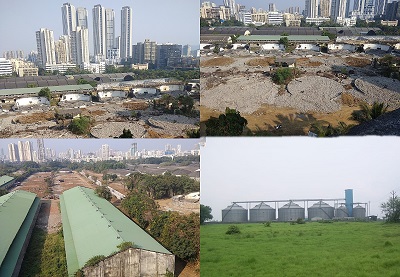Mumbai, (Samajweekly) In a first for Maharashtra, the Food Corporation of India (FCI) has razed its five-decades-old 20 eyesore, gigantic godowns at the Food Storage Depot (FSD) in Borivali east suburb, rendering the area airy and open, officials said.
These round-shaped godowns, made of cement-concrete to store wheat and rice for the millions of hungry Mumbaikars, shall now make way for 10 new, swank, ultra-modern, world-class steel silos with mechanised loading/unloading facilities.
This will be the first FCI-owned FSD and its second biggest in Maharashtra, spread over a stupendous 118 acres of prime land — just a stone’s throw away from the Sanjay Gandhi National Park (SGNP) — to undergo a major revamp by the Central government, slated to cost a few crore rupees.
The 10 steel silos, each with a capacity of 12,500 tons storage, will be around 25 metres tall, built on a concrete base, and will harness modern technology to load-unload the foodgrain, said FCI Divisional Manager D. Varaprasad Rao.
After all the pre-fabricated steel silos are erected within six months or so in 2024, the storage capacity of FCI’s Borivali FSD would nearly double – from the existing 130,000 tonnes to over 260,000 tonnes.
This would nearly equal the capacity of the state’s biggest FSD at Manmad, Nashik which has a foodgrain hoard strength of almost 259,166 tonnes, but in the traditional warehouses.
According to Rao, the new-look steel silos will eliminate the need for the bulky and often leaky bags of grains, and now the foodgrains would be transported in special train wagons that will unload the consignment directly into the silos, saving time and effort.
“The steel silos will consume vertical space, shall be all-weather-proof, a constant temperature level will be maintained for ensuring longer life of the wheat-grain, and considerably eliminate the problems of insects/rodents, etc.” Rao told IANS.
People living in the vicinity of most FSD’s have complained that they are plagued by tiny beetles, weevils, moths and even mosquitoes, particularly in a place like Mumbai.
However, there are another 33 massive rectangular godowns that will remain functional in the FCI FSD as they still have a few more years life-span, but in the long run, they would be replaced with steel silos or some other advanced storage systems, he surmised.
Of the 118 acres, a considerable portion is likely to be released which the FCI may utilise for other official purposes or enhance the green cover in the huge complex, which is bordered by scores of tall or small buildings on all sides, Rao added.
The Borivali east site is the sole FSD for Mumbai’s entire population and was set up after the FCI was born through a Central Act in 1965 to ensure food security for all Indians, with its original headquarters in Chennai, which was later shifted to New Delhi.
Besides, there are 57 other smaller FSD’s, including 44 which are on rent with other parties and 13 are owned by the FCI, all of which together store millions of tonnes of foodgrains for the state’s 12-crore population.
Barring a handful of the privately-owned FSD’s, all others continue to stock their grains in the old traditional godowns, with accompanying problems, said a manager at the Panvel site.
As per the Centre’s policy to modernise the grain handling and storage, from July 2022 onwards, silos with a capacity of a staggering 111.111 lakh metric tonnes (LMTs) are being developed at 249 FSDs all over India in three phases.
The beginning has been made with silos of 12.75 LMT capacity at 25 locations in Assam, Bihar, Gujarat, Haryana, Madhya Pradesh, Punjab and Uttar Pradesh, and silos of 11.50 LMT at 23 locations countrywide, including Maharashtra, being under various stages of development.










